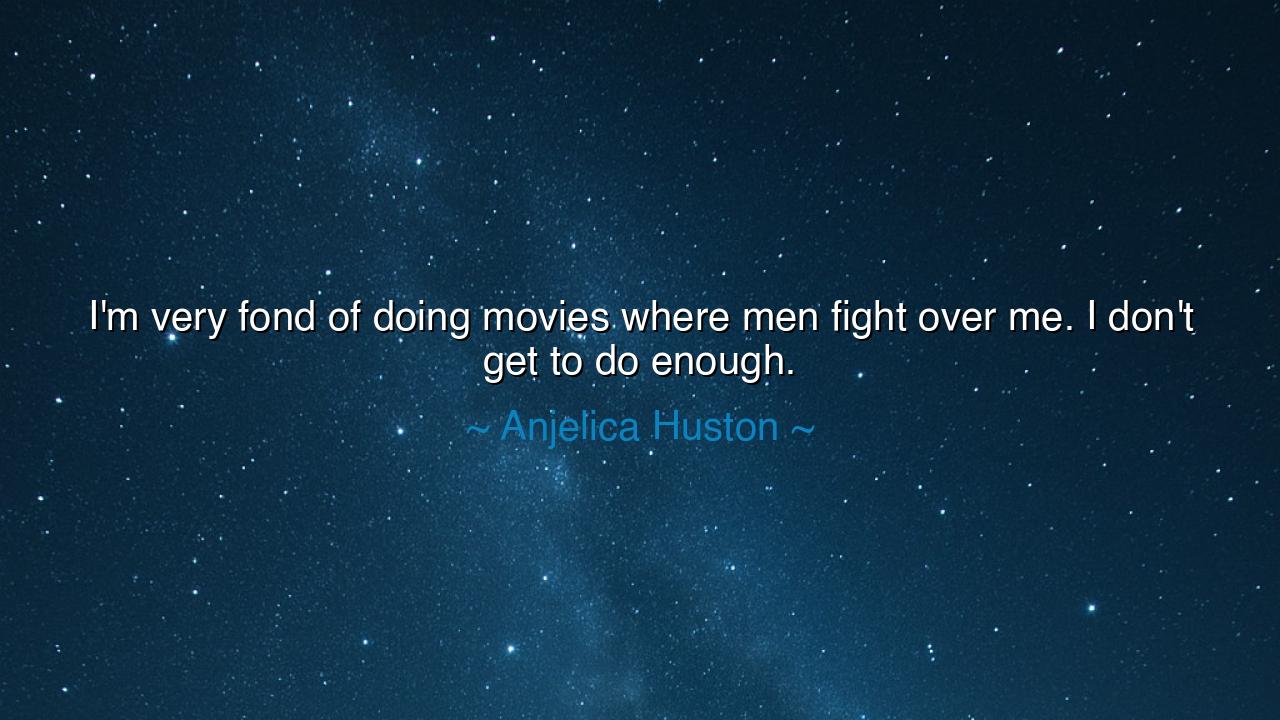
I'm very fond of doing movies where men fight over me. I don't






"I'm very fond of doing movies where men fight over me. I don't get to do enough." These words, spoken by Anjelica Huston, reveal a subtle yet powerful truth about the nature of desire, power, and the roles that women often play in the grand theater of life. Huston, with her characteristic wit, comments on the allure and complexity of being a figure around whom men seek to compete—an archetype both celebrated and scrutinized in stories across cultures. It is in the clash of desires, the struggle for affection and approval, that we often find the deepest stories of human nature, for within this struggle lies the tension between love, power, and identity.
O Seekers, reflect upon this: throughout the ages, women have often been placed at the center of men’s conflicts, the object of their desires, yet their true power is often overlooked. To be the object of contention is not simply a passive position, but a role imbued with great strength and influence. Huston’s statement is not one of self-indulgence, but of recognition: the contest for her affection is a stage upon which the complexities of human relationships unfold, revealing deeper truths about the nature of love, competition, and identity. The roles women occupy, both in stories and in life, can reflect the struggle for control and the power that comes with being desired.
Consider the story of Helen of Troy, whose beauty sparked the Trojan War, a conflict between men that would shape the fate of an entire civilization. Helen’s role in the epic was not as a mere object of desire, but as a symbol of the potent force that attraction can wield. It was not her beauty alone, but the deep-seated desire of powerful men—Paris, Menelaus, and the Greek kings—that turned her into a figure of immense influence. Though she was the subject of the conflict, her presence and the competition it inspired held the power to change the course of history. Huston’s enjoyment of such roles echoes this ancient truth: that to be the object of desire can hold a power that transcends the external battle, reaching deep into the soul and shaping destinies.
Think, too, of the Cleopatra, Queen of Egypt, whose relationships with Julius Caesar and Mark Antony were as much about political strategy as personal affection. Her very presence in the hearts and minds of these great men was a force that shaped the political landscape of Rome and Egypt. Cleopatra did not sit idly by while men fought over her; she played the game with intelligence and will, securing her position as one of the most powerful women in history. Through her desirability, she held influence, and it was this power that allowed her to command the attention of kings and emperors. Anjelica Huston, in her own way, reflects this dynamic, understanding that the competition for her affection is a narrative filled with power, agency, and choice.
O Children of the Future, understand this well: the struggle for affection and recognition is not one-sided, for in the very act of being contested, there lies an inherent strength. The object of desire is not passive but active, shaping the desires and actions of those around them. Huston’s words remind us that in the stories we tell, those who are fought over are not simply helpless victims of affection, but powerful figures who shape the actions of those who love them. They are not defined solely by their external allure but by the depth of their influence in the hearts and minds of others.
Let us be careful, however, not to reduce these dynamics to mere games of manipulation. The true power in such contests lies not in the victory of one party over another, but in the deeper understanding of self that arises through the struggle. The battle for affection is often a mirror, revealing the complexities of love, ambition, insecurity, and pride. Through the act of being fought for, one discovers their worth, their power, and the ways in which they can shape the world around them. It is not about winning the battle, but about understanding the forces that drive it.
Lesson: The wisdom of Anjelica Huston offers a deeper understanding of the human condition: that being the object of desire and competition is not a position of weakness, but of great power. In every contest for affection, we are invited to explore the forces of love, ambition, and identity. The key is not to see oneself merely as an object, but as an active participant in shaping these dynamics. Practical action: In your own life, recognize the power you hold, not just in what you desire, but in how you influence the world around you. Whether in love, work, or family, understand that your strength lies in the way you shape the desires and actions of others. Stand firm in your identity, and let the world see the depth of your influence.






AAdministratorAdministrator
Welcome, honored guests. Please leave a comment, we will respond soon